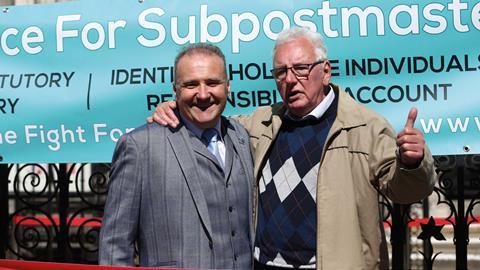Former postmaster who was called a ‘thief’ amid the Post Office IT scandal tells of pressure from solicitor to drop his defence
A former postmaster whose life was ruined by false allegations of theft has described how a solicitor representing the Post Office allegedly threatened him to stop him going to court. Lee Castleton, who ran a branch in Bridlington, Yorkshire, was dragged through a week-long trial without representation and ultimately made bankrupt by the Post Office’s claim for repayment of missing monies.
Castleton was accused of causing a £25,000 shortfall in accounts and suspended by the Post Office, despite calling its helpline every day asking for assistance.
In a witness statement published by the ongoing Post Office inquiry, Castleton said he had no choice but to contest the claim in court. He had been successful when the case was initially heard at Scarborough County Court, when the Post Office did not appear, but the decision was appealed and the case moved from Leeds to the Royal Courts of Justice at the request of the organisation.
Before the trial itself, Castleton claimed that he was contacted by the Post Office’s solicitor Stephen Dilley, who urged him not to go ahead with a hearing and to drop his defence.
Castleton replied that he had to contest the claim as he had done nothing wrong, which he alleges prompted Dilley to say: ‘But Lee, we are the Post Office, we will ruin you.’ When Castleton reiterated that he would make his defence in court, Dilley said: ‘Lee, just listen, we will ruin you. Think of your family.’
Following the trial, at which Castleton was unrepresented because he could no longer afford a lawyer, he was called a ‘thief’ by the Post Office counsel and was ultimately ordered to repay the £25,000 missing from his office accounts and pay the Post Office’s £321,000 costs.
Castleton told the inquiry that the Post Office gave evidence at his trial in 2006 that he was the only one with access to his Horizon account – a statement which was later found to be untrue.
The Gazette has seen documents showing that Castleton’s case was cited in subsequent correspondence with other postmasters who were considering defending civil claims.
Castleton was declared bankrupt and forced to close his shop and sell his home. His children were bullied and had to move schools, his wife suffered seizures brought on by the stress and family members were abused in the street. Castleton and his wife now live in rented accommodation in a different town.
Castleton added: ‘Mr Dilley was correct when he said that the Post Office would ruin me. It has.’
The former postmaster was a party in the group litigation that secured a ruling that the Post Office’s accountancy software was to blame for the losses. He received £28,500 in compensation. A civil judgment against him remains.
Dilley, the solicitor named in Castleton’s evidence, is now head of the commercial litigation team in Bristol at national firm Womble Bond Dickinson. Following an approach to him from the Gazette, his firm responded on his behalf to say it was not appropriate to comment while the Post Office Horizon IT Inquiry is ongoing.
None of the Post Office’s legal team from the time of Castleton’s trial is still with the organisation. A spokesperson said: ‘Victims of the Horizon IT scandal and the public have every right to expect that full accountability is established for what went wrong in the past and Post Office is openly co-operating with the independent inquiry in its vital work to do so.’
The SRA will have access to all documents received by the inquiry, which is being chaired by Sir Wyn Williams, and will shortly begin looking at the role of lawyers and other professionals in the hundreds of prosecutions and civil claims against postmasters regarding shortfalls caused by the Horizon system.
It is likely that a key part of the SRA’s investigation will be whether lawyers working internally or externally for the Post Office fulfilled their duties to the court and did not lose sight of their professional obligations by aligning themselves too closely with those instructing them.
Professor Richard Moorhead of the University of Exeter told the inquiry last year that there was no argument that Horizon harms directly arose from the way legal work was managed and conducted. ‘People were threatened, sued, fired and prosecuted via partly or wholly legal work,’ he said. ‘When Post Office, and Horizon in particular, came under scrutiny, denials, non-disclosure and delay were enabled at least in part by legal work.
‘At least as much, probably more so, than the software errors themselves, the legal work was the harm visited on the subpostmasters and the legal work supported or failed to challenge the corporate governance failures that mark this scandal so profoundly.’
Pictured above: Former Post Office workers Lee Castleton (left) and Noel Thomas celebrate outside the Royal Courts of Justice, London, after their convictions were overturned by the Court of Appeal




































